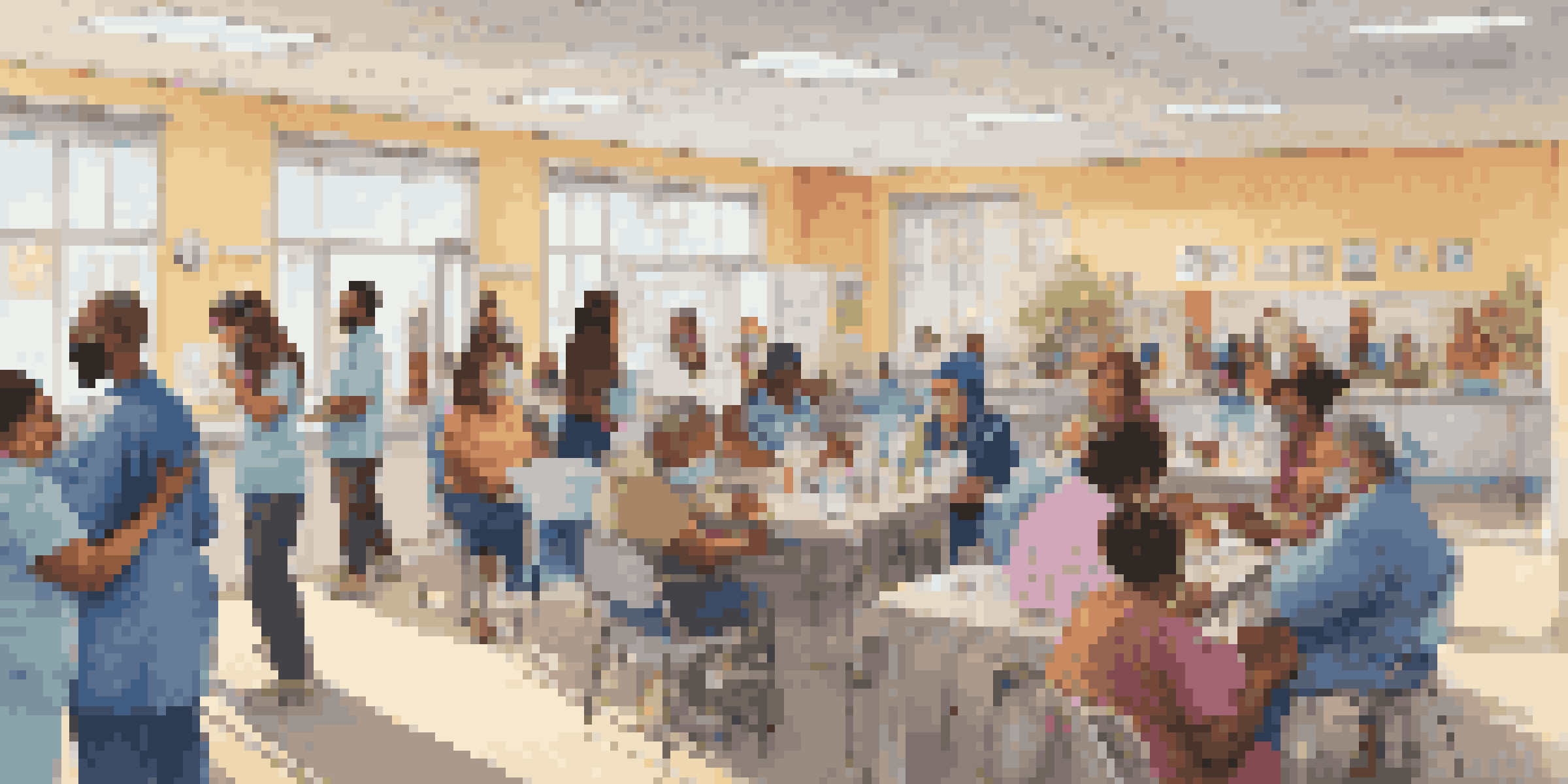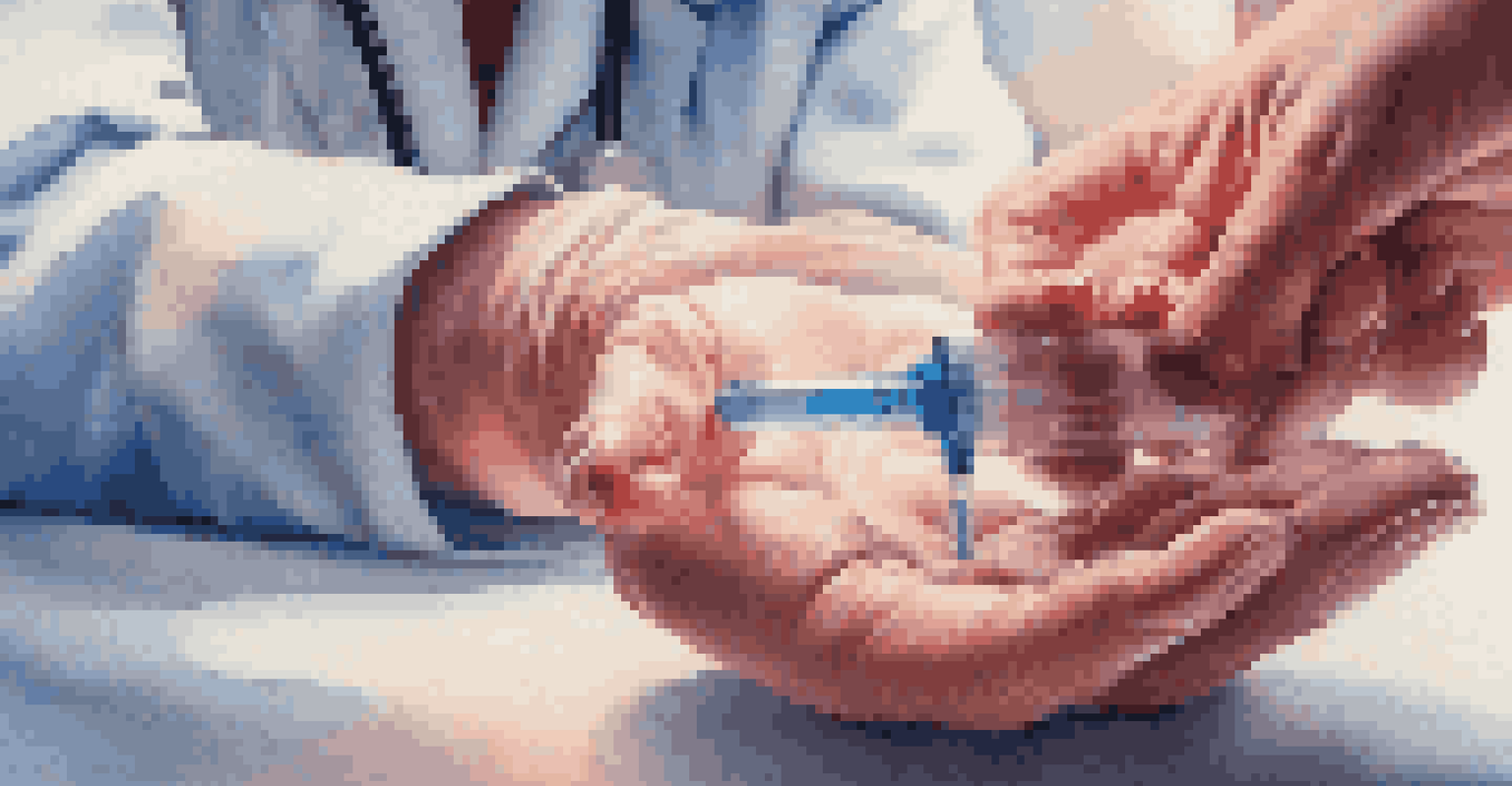Vaccinations: Your Best Defense Against Preventable Diseases

Understanding Vaccinations and Their Importance
Vaccinations are medical treatments that help our immune system recognize and fight off specific diseases. They contain weakened or inactive parts of a particular organism that triggers an immune response. Think of it as a practice run for your immune system, getting it ready for the real deal when it encounters a virus or bacteria.
Vaccines are the tugboats of preventive health.
The importance of vaccinations cannot be overstated; they are key in preventing outbreaks of contagious diseases. For instance, diseases like measles and polio, which were once common, have become rare in countries with high vaccination rates. This not only protects the vaccinated individuals but also creates herd immunity, safeguarding those who cannot be vaccinated.
In essence, vaccinations act as a shield for both individuals and communities, ensuring a healthier population. By getting vaccinated, you contribute to a collective defense that helps keep everyone safe and minimizes the risk of disease spread.
How Vaccines Work: A Simple Explanation
Vaccines work by introducing a harmless part of a pathogen into the body, prompting the immune system to respond. This response involves producing antibodies, which are like soldiers ready to fight off the real pathogen if it ever invades. It's a clever way to prepare your body without the consequences of actually getting sick.

To put it simply, when you get vaccinated, your body learns to recognize and combat specific germs. This memory allows your immune system to act quickly and effectively, should it encounter the actual disease in the future. Imagine it as a fire drill; practice makes perfect, ensuring that when the alarm sounds, everyone knows what to do.
Vaccinations Protect Communities
Vaccinations not only safeguard individuals but also foster herd immunity, which protects vulnerable members of society.
This mechanism is why vaccines are so effective in reducing infections and preventing disease outbreaks. By arming our immune systems with this knowledge, we can live healthier lives and reduce the burden on healthcare systems.
The Role of Herd Immunity in Public Health
Herd immunity occurs when a large portion of a community becomes immune to a disease, either through vaccination or previous infections. This collective immunity helps protect those who cannot be vaccinated, such as infants and individuals with compromised immune systems. The more people who are vaccinated, the less likely the disease can spread.
The greatest weapon against stress is our ability to choose one thought over another.
For example, if 95% of a population is vaccinated against measles, the chances of an outbreak are significantly reduced. This is crucial because it creates a protective barrier that keeps the vulnerable members of our society safe. It's a shared responsibility that highlights the importance of community action in health.
By understanding herd immunity, we can see that vaccinations are not just a personal choice but a communal duty. When we choose to vaccinate, we are not only protecting ourselves but also contributing to the safety of our friends, family, and neighbors.
Common Myths and Misconceptions About Vaccinations
Despite the overwhelming evidence supporting vaccinations, myths and misconceptions continue to circulate. One common myth is that vaccines can cause the diseases they are meant to prevent, which is simply not true. Vaccines contain either inactivated or weakened parts of the pathogen, ensuring safety while building immunity.
Another misconception is that vaccines are unnecessary because diseases are rare. While it's true that some diseases are less common today, this is largely due to widespread vaccination. If vaccination rates drop, we risk seeing these diseases resurface, putting everyone at risk.
Myths About Vaccines Debunked
Addressing common misconceptions about vaccines is essential for promoting informed health decisions and maintaining public safety.
By addressing these myths head-on, we can help individuals make informed decisions about their health. Understanding the facts behind vaccinations is essential in promoting public health and ensuring that communities remain safe from preventable diseases.
Vaccination Schedules: What You Need to Know
Vaccination schedules are designed to ensure that individuals receive necessary vaccines at the right time, maximizing effectiveness. For children, this typically includes a series of vaccines during their first few years of life. Following the recommended schedule helps build immunity when they are most vulnerable.
It's important to stay up-to-date with vaccinations as an adult, too. Certain vaccines may be required for travel, work, or other activities, and booster shots help maintain immunity over time. Regular check-ups with your healthcare provider can help you keep track of what you need.
By adhering to vaccination schedules, you not only protect yourself but also contribute to the well-being of your community. It's a proactive approach to health that can prevent outbreaks and safeguard public health.
The Global Impact of Vaccinations: A Success Story
Vaccinations have played a crucial role in public health globally, leading to the eradication of diseases like smallpox. This success story showcases the potential of vaccines to eliminate life-threatening diseases and improve overall health outcomes. When communities come together to vaccinate, the results can be truly transformative.
In recent years, global vaccination efforts have also helped to significantly reduce the incidence of polio and measles. Collaborative programs, such as those supported by the World Health Organization, emphasize the importance of vaccinations in achieving public health goals. These efforts demonstrate how united actions can lead to substantial progress.
Future Innovations in Vaccination
Ongoing research and advancements in vaccine technology promise to enhance effectiveness and expand protection against multiple diseases.
The global impact of vaccinations serves as a reminder of the power of science and community commitment. By investing in vaccination programs, we can continue to protect future generations and work towards a healthier world.
Future of Vaccinations: Innovations on the Horizon
The future of vaccinations looks promising, with ongoing research and innovations paving the way for more effective solutions. Scientists are exploring new technologies, such as mRNA vaccines, which have shown remarkable efficacy during the COVID-19 pandemic. These advancements could revolutionize how we approach various infectious diseases.
Additionally, researchers are working on developing vaccines that can target multiple diseases at once. Imagine a single vaccine protecting against several viruses! This could simplify vaccination schedules and enhance global health efforts, making it easier for everyone to stay protected.

As we look ahead, the continued investment in vaccine research will be crucial in combating emerging diseases. With each innovation, we take another step closer to a healthier future, where preventable diseases are kept at bay.